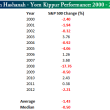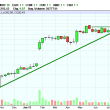"Exponential Business Success"
by William Smead, Smead Capital Management
At a major conference in November of 2012, the futurist, Peter Diamandis, shared the concept behind his book, Abundance: The Future Is Better Than You Think. Diamandis, a graduate of MIT and Harvard Medical School, has been a thought leader in everything from space travel (International Space University and X Prize Foundation) to the Internet. His concept is simple. He believes that participants in the US economy and US stock market are drastically underestimating the exponential success which comes from the unlimited impact of the Internet and technology.
What got me thinking about this was pondering thoughts that Bill Miller at Legg Mason has espoused in the last decade. Miller has had very successful investments beginning in the 1990s by attempting to get his mind wrapped around the unlimited business potential of companies when they draw on the limitless exponential nature of the Internet. He did really well in the 1990s on AOL (AOL) and more recently in Amazon (AMZN). He believes, as we do, that many money managers are underestimating the productivity and future free cash flow generation of businesses which harbor the power of the Internet to dominate multi-billion person markets.
We at Smead Capital Management would like to share how this plays out in our stock selection and view of the US economy. First, the largest age group, representing over 25% of US population, is the 18-37 year old “echo-boomers”. There are 86 million of them. Regardless of what you think of this group, they have one characteristic which is unique in US economic history. They are the first US generation which is pretty much universally tech savvy. What will our economy be like when the echo-boomers are 55 years old like me and are completely comfortable with technology and its multiple uses?
When I was 20 years old in 1978, we learned Fortran language at Whitman College. The only way to use a computer back then was to write code into the machine which would tell the computer what you wanted to do before you loaded in the info that you wanted to compute. It was severely theoretical, tedious and was the domain of tech geeks who had very little life outside of academics. The exponential business success created by the adoption of the computer ultimately spread to the rest of society over the next 30 years, but didn’t affect success either individually or in business anywhere as fast as the Internet. Nearly every trades person and small business owner under the age of 35 today is tech savvy and an effective user of smart phones and the Internet. Think how explosively successful our economy could be as it becomes dominated by these young people. We are on the same page with Dr. Diamandis on this line of logic.
Second, we, like Bill Miller, feel that investors are having a hard time realizing how unlimited the future free cash flows are from businesses who harness this exponential success made available by the Internet. Shelley Banjo of the Wall Street Journal wrote a piece called, “After Decades of Toil, Web Sales Remain Small for Many Retailers”. In it she pointed out that online sales are 5.8% of retail sales in the US currently. We have seen numerous estimates of that number growing to as much as 15 to 20% in the next twenty years. What is a business worth which gets it fair share of these larger online sales figures and reaches all the way around the world via the Internet? Since valuation matters dearly to us, we are not owners of the aforementioned companies.
We believe some Internet-based businesses are incredibly attractive because the profit margins can be very high. This comes from an extremely low cost structure and exponential economies of scale due to the huge size of the potential market. We are not discussing this because we are futurists like Diamandis or because we understand all of the companies benefitting from this phenomena. We do believe that this could be bigger than our minds can comprehend. Fortunately, that doesn’t stop us from getting excited about high-margin businesses purchased with an eye on valuation, which could create wealth.
In summary, we believe that Peter Diamandis and Bill Miller are spot on when it comes to being optimistic about the unlimited potential of companies which succeed via the Internet’s exponential nature. We also believe there is an under-appreciation of this potential in the US stock market and the US economy as we move farther away from the difficulties left over from the past.
Best Wishes
William Smead
The information contained in this missive represents SCM’s opinions, and should not be construed as personalized or individualized investment advice. Past performance is no guarantee of future results. It should not be assumed that investing in any securities mentioned above will or will not be profitable. A list of all recommendations made by Smead Capital Management within the past twelve month period is available upon request.
This Missive and others are available at smeadcap.com
















